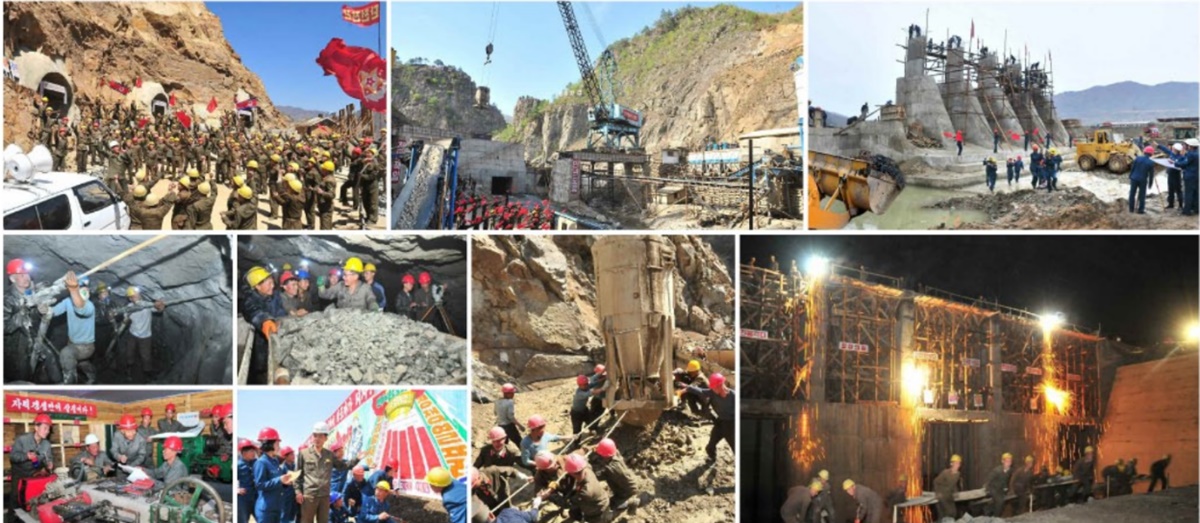
Amidst North Korean state efforts to construct the a hydroelectric power plant in Tanchon, South Hamgyong Province to resolve the country’s electricity issues, sources in North Korea report that residents mobilized to work on the project are dealing with very poor conditions, with food and even basic tools needed for the construction work not being provided.
“The intensity of the work required on the power station is high and the workers are complaining that they are getting insufficient sleep and food, but the authorities have done nothing to address these issues,” said a Ryanggang Province-based source on March 13.
“A woman in her early 20s, who had been working at the Hyesan Textile Factory before being mobilized to work on the Tanchon Power Station construction project for six months, had such a difficult time that she ran away after just three months.”
According to the source, the laborers are required to work for 15 hours a day and sleep less than three hours per day. The authorities don’t provide them with basic necessities like gloves, so they are working with cement mixtures using their bare hands. They are forced to continue their work even when their hands start to bleed.
“They are working in the extreme cold and digging through sludge, and the authorities force women to complete the same tasks as men,” said the source. “They have to dig through the sludge until they reach the bedrock and use their bare hands to clean it with water. Young women at the site have hands that are covered with blood, but the construction managers don’t care.”
Malnourishment among the construction workers is another serious concern, according to a source in South Hamgyong Province, who said that “the food provided by the cafeteria is just boiled corn with salted soup or corn soup.”
“These dishes don’t provide much in the way of nutritional value, so the workers end up still being hungry after the meal,” he said.
Workers affiliated with central government-run trading companies work in slightly better environments; however, shock troop brigades deployed from the provinces and military units aren’t provided with enough food either, an issue that has led more and more workers to run away from the construction site.
Kim Jong Un has designated the construction of the power plant in Tanchon a national priority to resolve the country’s electricity issues, but the lack of money and food has created a situation where laborers aren’t being provided with appropriate resources.
According to the sources, the construction site is located far from major towns and cities, meaning that even if workers have money to spare, there are few places they can go to purchase anything.
Some food merchants who are aware of the situation show up once a week at the construction site to sell tofu rice, soy-based mock meat, rice, cornbread, and corn soup at extravagant prices. Despite the high prices, the merchants sell their food very quickly to the hungry workers.
“The poor living and working conditions are compounded further by the mistakes made by workers on the site, which means that construction has to be re-done in many areas,” said a separate source in South Hamgyong Province. “Quality control inspectors are frequently bribed to turn a blind eye to the defects in the construction work.”
North Korean leader Kim Jong Un mentioned the Tanchon Power Station for the first time during his 2016 New Year’s Address. During the Seventh Party Congress in April that same year, he underscored the “need to complete [its] construction quickly.”
The groundbreaking ceremony for the Tanchon power plant was held in May 2017 with Cabinet Premier Pak Pong Ju in attendance. North Korea is aiming to complete the plant’s construction by 2020, which is the 75th anniversary of the founding of the Workers’ Party of Korea (WPK) and the final year of the country’s National Economic Development Five Year Strategy.
Kim has emphasized the need to focus the country’s resources on the Tanchon power plant’s construction each year during his New Year’s addresses. During his 2019 New Year’s Address, Kim said, “We should take the problem of easing the strain on electricity as an undertaking of the whole state, step up the construction of hydroelectric power stations including Orangchon and Tanchon power stations and create a capacity for generating tidal, wind and atomic power under a far-reaching plan.”


















